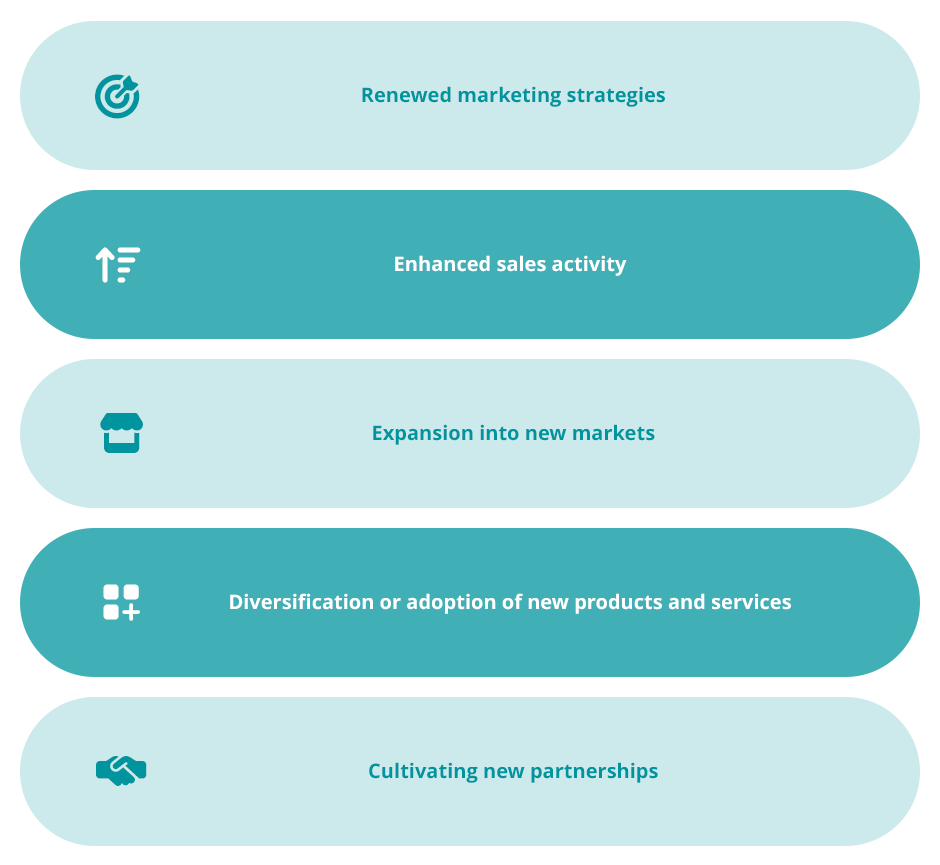Continually developing your business with a plan or strategy is a business must. Whether you’re embarking on a new business venture, or ensuring your existing business maintains its edge, you should always have a business development plan or business development strategy in the works.
Not doing so will lead to stasis, missed opportunities, and wasting the potential of your business.
So, what exactly is business development and how do you plan or strategise for it?
What is business development?
It’s the ideation behind creating strategies and plans to further a business’s interests, viability, and scope alongside the actions that will create this eventuality.
Scott Pollack from Forbes frames the concept as:
“Business development is the creation of long-term value for an organisation from customers, markets, and relationships.”
It’s generally a combination of various pursuits and initiatives which relate to the growth and continued health of a business. Considerations include:
- renewed marketing strategies
- enhanced sales activity
- expansion into new markets
- diversification or adoption of new products and services
- cultivating new partnerships
For example, you may have a successful business selling surfboards in Australia and have only focused on marketing and selling to that base.
Business development might see you looking to expand your market into New Zealand and Hawaii.

Why is business development important?
It’s critically important as it helps assure the profitability, growth, and health of a particular business.
The antithesis of business development is stagnation. If you don’t continually invest and re-invest in business development, you’re essentially sitting still and could be awaiting the gradual decline of your business.
You may very well be fine by not putting some muscle into developing your business. Then again, it’s hard to see a lot of growth happening if you don’t.
By not pursuing business development, you can give up the opportunity to create a more profitable, resilient, and competitive business.
What is a business development strategy?
Now that we understand the concept, how do we frame up and plan the manifestation of our business development goals? With a strategy, of course.
Simply, a business development strategy (also called a plan) is the documented map we lay down to achieve the goals we’ve set. Creating a plan will help you focus on long-term business outcomes.
When we refer to a business development plan or strategy, we’re referring to a concrete document (like a business plan) which sets out the goals and all the actions needed to reach those goals.
If we take our example of an Australian based surfboard retailer from above, a plan for a new target market may include:
- growth opportunities in your industry
- business case for expansion into new markets of New Zealand and Hawaii
- a fresh sales plan
- a fresh marketing plan
- market research
- new distribution models
- increased production plans
- possible partnerships
- legal consultation
- ways to measure success and goals to attain
- forecasts of profitability
- costings
Through creating a business development strategy document, these steps can then be executed through a set of material actions. Also make sure you’re thinking long-term when you write it.
What does a business development manager do?
A business development manager, often termed a BDM, is the person you employ to oversee the roll out of a business development strategy and makes it a reality.
More than just a salesperson (as many BDMs are thought to be), the role of a true BDM in your sales team has broader scope than just sales targets.
A BDM’s responsibilities include:
- executing on a strategy
- finding new opportunities for growth
- researching markets and leads
- collaborating with marketing and design services
- maintaining current clients and customers
- seeking out new clients
- working to targets and KPIs
- helping to form partnerships
Understanding the importance of successful business development, committing to putting pen to paper and writing a plan or strategy (and then executing on that plan) is one the best ways for a committed business to achieve long term, stable growth, and prosperity.
If you’re at a loss as to how to start pursuing business development, you should be reaching out to your business advisor or creating a relationship with one. They’ll be skilled and experienced in this process and can help you tailor a personalised plan.























